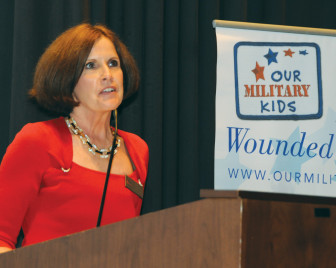
Photos courtesy of Our Military Kids
Hannah Ford gets a hug from her father as he is about to deploy. Hannah received a grant from Our Military Kids for gymnastics classes, which helped her stay positive during his deployment. Father and daughter Skyped while he was away.
Linda Davidson founded the nonprofit Our Military Kids (OMK) in 2004 because she realized the children of “suddenly military” members of the National Guard and the Army Reserves face stressful situations and have developmental needs their deployed parents may not be able to fill — such as having no mom or dad at baseball games or ballet lessons, not to mention getting by on smaller family budgets as parents’ income drops to military levels.
Davidson personally knew military families and heard of their struggles. And, a mother of three grown kids and grandmother of five, she figured a suddenly missing parent would be stressful to children, who would need extracurricular activities more than ever to cope with a new void.

Linda M. Davidson, founder and executive director of Our Military Kids, McLean, Va.
“I learned what I could through the Internet and picking the brains of others in the nonprofit business,” said Davidson, OMK’s executive director.
She quickly learned that federal law requires nonprofits to have boards of directors and file reports about their finances with the IRS.
Nonprofits are required to report annually to the IRS, explained Jennifer Chandler, vice president and director of network support and knowledge sharing at the National Council of Nonprofits, but this is “distinct from an independent audit. There is not an obligation to file the [financial] audit with the IRS.”
Independent financial audits “as opposed to the audits that the IRS conducts to review the filings a nonprofit has submitted” (see sidebar) are important “because during the process of an outside, objective review of the nonprofit’s financial position, the auditors may find irregularities in financial management or record-keeping practices that otherwise could go unnoticed by the board or management,” Chandler explained.
“It’s important to have an audit by an independent outside auditor so it can be posted on GuideStar and other sites to encourage future donors and help us apply for grants,” agreed Michelle Nelson, OMK’s director of family programs.
GuideStar is a service that reports and verifies information supplied by the approximately 1.2 million U.S. nonprofits, such as whether donors’ funds are spent as promised. Nonprofits file their tax returns — or Form 990 — to the IRS, and GuideStar collects and publishes that data.
According to Chandler, at the National Council of Nonprofits, 83 percent of U.S. nonprofits have less than $1 million in annual revenue, and of those, 92 percent have less than $500,000, like Our Military Kids.
“It is unlikely that the majority of charitable nonprofits will have someone who has an accounting degree on staff,” she said. “Most hire a CPA firm to review financial statements. The purpose is to give boards of directors an opinion about whether or not the financial statement represents the financial position of the nonprofit accurately. The board or funding sources may want that assurance, and nonprofits depend on the public’s trust.”
OMK “has a bookkeeper who monitors our finances and ensures the integrity of our income and expenses,” said Davidson. “Additionally, one of our board members is an investment broker who serves on multiple nonprofit boards.”
Also, 39 states require charitable nonprofits to register before engaging in fundraising activities, Chandler said. “When a charitable organization receives a gift, the donor may say, ‘I want you to use the gift for something special.’ Part of the auditor’s responsibility will be to see if the nonprofit followed the instructions of the donor.”
“Financial transparency is important to our donors,” said OMK’s Davidson. “They want to know their donation is a wise investment. We strive all year to keep our overhead costs as low as possible so that when we are audited, the reports reflect a very low overhead-to-support ratio.”
She added: “Because we are so diligent, Our Military Kids has never had an audit that has raised any flags about how our finances are managed.”
See sidebar “Avoid an IRS Audit”


























